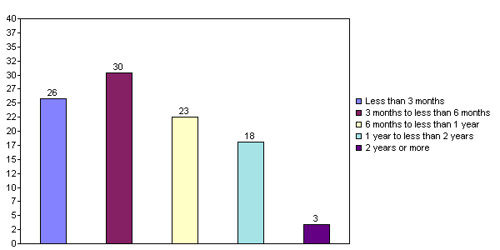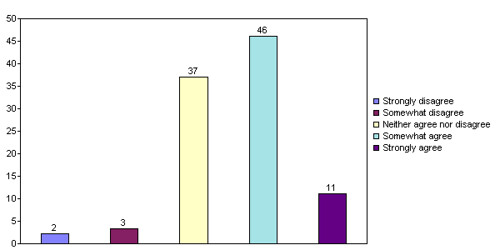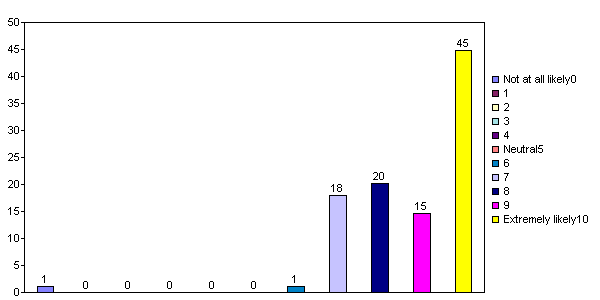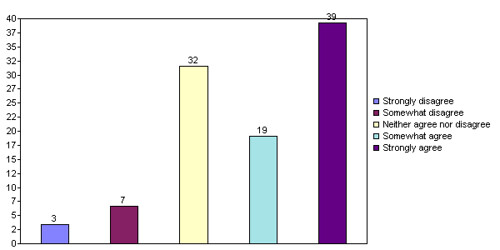Earlier this week, I published my findings from the survey to find out who reads the web strategy blog (part 1/3). Now that we have a good sense of who’s in the community, let’s see how you use me. By the way, I’m extremely happy that you use me, as I’m publishing these thoughts and content so you trust me, expand my platform, you’ll grow with me, and eventually work with me.
Here are the findings of how people use this blog, see the finding, my thoughts, and the associated data. Please note this data was compiled by an official Forrester survey, over 88 responses.
A bit of humility…
These findings are overall positive, and I’m gracious and thankful for you being part of this community. I make a lot of mistakes (and consider myself an average, rookie analyst) but am glad to share my passion with you. Regardless of these marks, I’ll still strive to learn, improve my weaknesses, and help others. Thank you!
Finding: Readers would recommend this blog to others
To me, this is the strongest metrics of the entire survey, this net ratings score indicates that you’d be willing to share this blog with others –the highest commendation possible.
“Would you recommend this blog to a friend or colleague?”
Finding: Many posts read
Many readers are digging into every post that is published, and that’s great. Based upon the Google Analytics time on site (attention data) it’s clear that most skim, but some meaty posts have up to 5 minutes attention rate, suggesting true in depth reading. I’m constantly in a state of learning from the commenters, you help me (and the community) to get smarter.
“How frequently do you read Web Strategy by Jeremiah Owyang?”

Finding: Most have been reading since the last half year
This is interesting, while many new readers came around since I joined Forrester, there’s still quite a few older readers that have been with me since Hitachi. Forrester has been a tremendous platform, I’ve doubled my readership since I started.
“For how long have you been reading Web Strategy by Jeremiah Owyang?”

Finding: Most somewhat agree this blog helps to inform the actions I take at work
“This blog helps inform the actions I take at work”
This is a powerful metric, and it’s skewing towards the right bar graphs, which indicates that this blog influences workplace behavior. To what degree? that’s debatable, as it could likely be ‘what not to do’, heh.
Finding: Most strongly agree this blog helps to gain industry-specific insights
Similar to the finding above, this suggests that the community is heavily learning on where this blog suggests the market is headed. I’m in the blessed perched position where I can talk to many vendors and clients, and you’re seeing just some of the output on this blog.
“This blog helps me gain industry-specific insights”

Finding: Most somewhat agree that this blog helps to keep up on cutting edge marketing tech
“This blog keeps me up to date on cutting edge marketing technologies”

Finding: Many strongly agree that this blog is a cheap way to get analyst info
Not sure if this is good or bad, but I can assure you, you’re only seeing a small percentage of the insight that I give to clients in the form of reports, advisory, inquiry, and in person meetings. Also, blog posts are clearly no where near the accuracy nor specific insight and recommendations that you can get from reports.
“This blog is a less expensive source of Forrester information than becoming a client”
Finding: You come here to learn dammit, no f*cking fun allowed
Apparently, I’m no fun. Heh, well that’s ok, this blog is intended for business people, read the tag line on my banner, this is my mission. Although it skews slight to the right, as a somewhat, the goal of this blog is to educate, not entertain.
“[Does]This blog provides me with entertainment?”

Finding: Most somewhat agree that this blog helps with marketing program performance
I don’t discuss marketing mixes, nor do I discuss pricing, but I do discuss measurement, being effective and efficient so no surprises here.
“This blog helps me improve marketing program performance”

Finding: Most somewhat agree that this blog helps to develop effective marketing strategies
I’m somewhat scared that marketers would rely on my blog alone to develop marketing strategies, so I certainly hope this is a supplement. Some of the content here is editorial, and you should recognize what is a best practice and what is not.
“This blog helps me to develop effective marketing strategies”

Finding: This blog doesn’t impact finding technology vendors
Yup, no surprise here, I often list out indexes of industries, but I don’t make specific recommendations, that’s reserved for Forrester clients.
“This blog helps me find technology and/or services partners”
Finding: This blog doesn’t impact building teams or skills
No surprised here, either. I don’t discuss team building, or what the right skills are (except for the emerging social media strategist and community manager), no worries.
“This blog helps me build the right teams and skills”

Thanks again for reading, and keep on using me!




Well done, Jeremiah,
I’m not surprised that these came out so strong. You’re more than a rookie analyst. You bring a lot of intuitive detail to the table. Thanks for a great blog
Do I really need to point out the selection bias effect in these results? You surveyed current readers of your blog — of course you’re going to see generally positive feedback.
That’s not to say the dataset is completely invalid, of course. You just need to take the bias into account when drawing conclusions from it.
lux
hmm, not sure if I get your point.
The scope is for readers of my blog…I wanted to know what my readers thought.
But you’re right, if they didn’t like something, they probably would have moved on.
There is some qualitative feedback that suggests some things to improve upon, the score isn’t perfect
😉
Sorry i didn’t see the post to vote, however add this to the list. I find your blog a very intelligent source of digital strategy, and thank you for not pushing a book on your blog.
Valuable information – especially for justifying our blogging time and efforts with our respective employers.
Interesting… I think some same principles we apply to community management are being discussed; specifically how we track the value we deliver to our members.
Having spent sometime in the political side of the house, I have to disagree with lux here. Any non-random, self selected poll- especially about content- need just a small amount of weighting against positive bias because people who are unhappy with the content are potentially more motivated than the average user to voice an opinion.
In fact, I would say that reader polls tend to skew against the average reader, who like are less likely to participate in a poll but still count on the blog as a daily resource. To borrow from Forrester’s own social technographical findings (I’ve always wanted to say that), poll participants are more likely to be “critics” and “creators” and represent only about a third of readers. One could argue that Jeremiah may draw a readership exclusively of people who tend to be “creators” and “critics” but I think that is different discussion altogether.